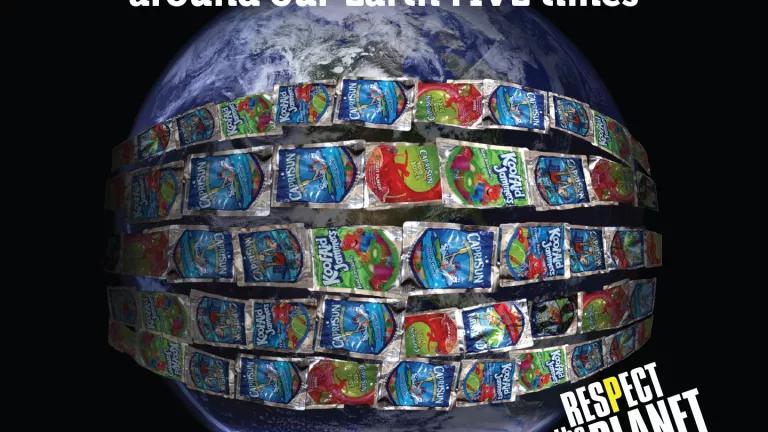
This week, NRDC joined a coalition of organizations working on waste and recycling, plastic pollution and resource conservation to launch the Make It, Take It Campaign, a collaborative effort to pressure consumer goods companies to take responsibility for packaging waste and to educate and mobilize citizens for sustainable packaging policies. The campaign is targeting the Capri Sun juice pouch, a highly visible example of consumer packaging that can’t be readily reused, recycled or composted. The campaign estimates that 1.4 billion Capri Sun pouches are landfilled or littered each year in the United States. Stacked end to end, that’s enough pouches to wrap around the Earth almost five times (121,527 miles) – or to reach nearly half-way to the moon.
The Make It, Take It Campaign is urging KRAFT Foods, the maker of Capri Sun products, to begin the switch to package Capri Sun and all other products in reusable, recyclable or compostable packaging.
Capri Sun pouches are made by bonding layers of aluminum and plastic together, making them very difficult to recycle. Only 2% are estimated to be collected nationwide for recycling (primarily through TerraCycle, which repurposes hard-to-recycle packages and products into items like tote bags and laptop cases). Packages like Capri Sun pouches are designed to be used once and then thrown away, requiring a constant input of energy, water, and other natural resources (including non-renewable fossil fuel-derived plastics) to make new packages.
Plastics make up almost 13 percent of the municipal solid waste (MSW) stream, and most of that plastic is packaging, including beverage containers. In 2012, the United States generated almost 14 million tons of plastic waste in the form of containers and packaging, only 14% of which was collected for recycling.
Food and beverage packaging and containers are also among the top five littered items found on beaches and coastlines. In the ocean, plastic packaging breaks down into small particles, which can harm marine life and transport toxic chemicals. A recent NRDC report (Waste in Our Water: The Annual Cost to California Communities of Reducing Litter That Pollutes Our Waterways) estimates that the state of California spends nearly $500 million annually preventing trash – much of it plastic packaging – from polluting the state’s beaches, rivers, and ocean.
And Capri Sun pouches are just the tip of the iceberg. KRAFT is just one of many companies that package products in hard-to-recycle and non-compostable plastic packaging. But other companies are pledging to increase the recyclability of their packaging, and some of Capri Sun’s competitors package similar products in highly-recyclable aluminum or PET containers.
There are some environmental advantages to lightweight plastic packaging (including requiring less fuel to transport and contributing to greater shelf life). But recyclability means that materials can be returned to the production cycle, each time saving energy, water, and natural resources compared with manufacturing from virgin materials. As William McDonough noted in a recent interview, “It's so immensely curious how stupid modern packaging is, and it's getting worse…. You look at an organic, gluten-free kale chip package and it's wrapped in seven plastics with undefined inks and metallized polymers. It doesn't have a recycling symbol on it because you could never recycle it. The package might even weigh more than the contents. And yet it's being put forward as a more efficient package. Isn't it astonishing that we would have that much focus on what's inside the package and so little focus on what's outside?”
Please join with NRDC and the Make It, Take It Campaign and tell Capri Sun manufacturer KRAFT Foods to take responsibility for its packaging waste.
Click here to tell KRAFT Foods CEO Tony Vernon to “Respect the Planet. Stop the Pouch.”
You can also send a message to KRAFT through their Facebook page or Twitter, using the hashtag #makeittakeit.
NRDC and a growing coalition of waste management, community, environmental, and business groups support measures to address the environmental issues associated with the proliferation of single-use plastic packaging, including supporting extended producer responsibility policies that ask consumer brands to share responsibility for ensuring their packaging gets reused, recycled, or composted, and doesn’t become litter when consumers are finished with it.
To learn more, visit www.nrdc.org/oceans/plastic-ocean and http://www.stopplasticpollution.org/, and join the conversation on Facebook or Twitter.

